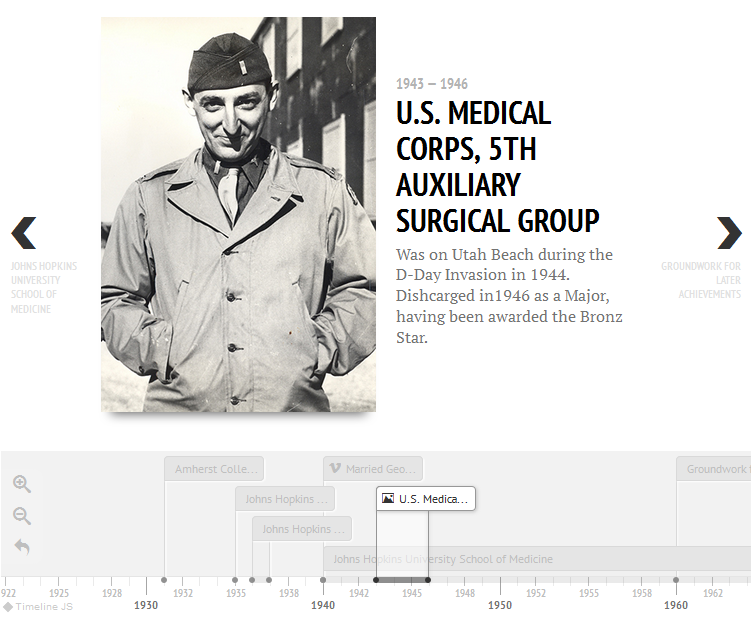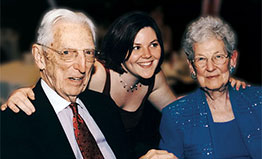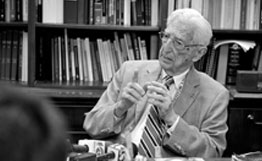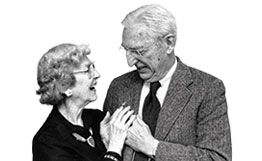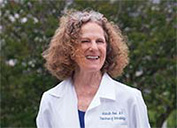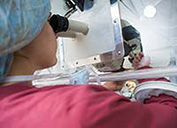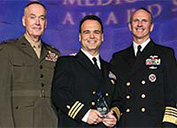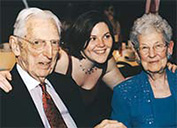Remembering Dr. Howard
EVMS salutes Howard Jones Jr., MD, surgeon, scientist, mentor, leader — and the nation’s pioneer of reproductive medicine
At 27, surgeon Howard Jones Jr., MD, published his first journal article. Reprints of his articles, most of which he co-authored with his wife, fill 18 volumes on a shelf in his EVMS office.
At 104, before he died July 31, Dr. Jones still worked in that office two to three hours a day. His most recent journal article and 13th book were published in 2014. He scheduled his lectures and meetings on his iPhone.
Over his 80-year career in medicine, "Dr. Howard," as he was known, inspired and touched millions around the world. The main reason? In 1981, thanks to techniques he and his late wife, Georgeanna Jones, MD, pioneered, the first in vitro fertilization (IVF) baby was born in the United States. That success gave rise to the subspecialty of assisted reproduction, as well as the Howard and Georgeanna Jones Institute for Reproductive Medicine at EVMS.
The most remarkable thing about Howard was not just that he was an over-achiever, but the level of overachiever that he was.
Today, about 1 percent of all U.S. births are the result of IVF, and some experts say the number of IVF births now exceeds five million worldwide.
Drs. Howard and Georgeanna Jones came to EVMS in July 1978 after reaching the then-mandatory retirement age at Johns Hopkins University School of Medicine. Already renowned in their fields — Dr. Howard for gynecologic surgery, Dr. Georgeanna for reproductive endocrinology — they were recruited here by their friend and co-founder of EVMS, Mason Andrews, MD, to co-lead the school's Obstetrics and Gynecology department.
Gerald Pepe, PhD, the EVMS Foundation Chair in Biomedical Sciences and Professor and Chair of Physiological Sciences, arrived at EVMS the same week.
"Howard always asked the challenging questions," Dr. Pepe says, "not only of others' work but of his own. He knew without that questioning, science doesn't move forward. I enjoyed every minute I spent talking with him, and I always walked out of the room knowing more than when I walked in. I gave a seminar in June, and who was in the front row asking questions? Howard Jones."
When Sarah Smith Houck of Virginia Beach read that Drs. Howard and Georgeanna Jones were opening an IVF clinic, she jumped on the phone. "I volunteered for anything they wanted to try," she says. "Not long before that, I had asked my gynecologist about in vitro research, and he said it would never happen in my lifetime."
As the Jones team's first patient, Ms. Houck tried IVF seven times without success. "A year later," she says, "my husband asked me to give it one more try. So I called and they said come in right now." That was December 1984. Her twin daughters, Heather and Ashley, were born nine months later. Their photo still graces a shelf in Dr. Jones' office.
"He got so much joy from seeing his patients have a child," she says. "Whenever I was around him, I would just sit there in awe. He was my miracle."
He was Judith Carr's miracle, too. Ms. Carr gave birth to the nation's first IVF baby, Elizabeth Jordan Carr, in December 1981. After meeting with the Jones team, she says, "I knew we were in the right hands. I went through the IVF procedure on my 28th birthday, and I still laugh when I think about Dr. Jones and the team singing 'Happy Birthday' to me as they performed it."
During her pregnancy, a monthly checkup with the team meant she had to fly alone to Norfolk from her Massachusetts home while her husband worked. "The first time, Dr. Jones asked how I got to the hotel from the airport, and I said I took the airport shuttle. And he said, 'Well, you won't be doing that again,' and from then on, he picked me up at the airport in his 15-year-old station wagon."
His care and concern extended to her family's privacy, Ms. Carr says. "He was very protective of us. He included us in all the conversations about how the news would be disseminated and who would have access to us. We became part of the team in that respect."
Also part of the original IVF team was embryologist Lucinda Veeck Gosden, DSc, who's now retired. "The most remarkable thing about Howard," Dr. Gosden says, "was not just that he was an over-achiever, but the level of overachiever that he was."
After traveling 31 hours to New Zealand with Dr. Jones and his wife, Dr. Gosden remembers struggling to keep up with him.
"I was anxious to hit the hotel room for some sleep," she says, "but Dr. Howard announced that we should throw the suitcases in the rooms and set out immediately."
Even after he turned 100 and used a motorized wheelchair to get around, "I had to run to keep up with him," says Nancy Garcia, Dr. Jones' assistant for 36 years. She laughs explaining that he was a terrible speller and couldn't read his own handwriting. Then choking back tears, she says, "He was the easiest person in the world to work for. He was like my second father. As long as he needed me, I wouldn't retire."
Sergio Oehninger, MD, PhD, is the Henry Clay Hofheimer II Chair in Obstetrics and Gynecology, Vice Chair of EVMS Obstetrics and Gynecology and Director of Reproductive Endocrinology and Infertility at the Jones Institute. Dr. Jones' work brought Dr. Oehninger to EVMS from Uruguay in 1986. "What I learned from Howard," he says, "was his thinking process – how to determine the right question to ask and how not to get discouraged if you don't have the answer today."
He also talks of Dr. Jones' approachability. "Whenever we had a question, we would bring it to him. He was a unique human being. He was old-fashioned in a way, humble and simple, but a progressive thinker and caring mentor. You don't find his kind of leadership very often."
Dr. Jones demonstrated that leadership in 1984 by pushing the American Fertility Society, now the American Society for Reproductive Medicine, to establish an ethics committee. "He was the champion of ethics in that society," Dr. Oehninger says.
Judith Carr agrees. "He was incredibly ethical," she says. "He was very careful about that because he knew it would be a vital part of the IVF legacy."
Larry Hultgren, PhD, Professor of Philosophy at Virginia Wesleyan College, serves on the EVMS Institutional Review Board and taught ethics courses and seminars at EVMS with Dr. Jones for a decade. "The fact that I had a chance to work with him and call him Dr. Howard has been the most stellar aspect of my career in bioethics," he says. "So much of what I learned from him I've been able to take back to the students in my classroom.
"We just conducted an ethics seminar together in late June. This man was vital and vibrant right up until the end."
